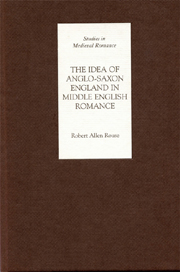Book contents
- Frontmatter
- Contents
- Miscellaneous Frontmatter
- Acknowledgments
- 1 Anglo-Saxonism: The Remembrance and Re-Imagining of the Anglo-Saxon Past
- 2 Remembering Alfred in the Twelfth Century
- 3 The Romance of the Anglo-Saxon Past
- 4 The Romance of English Identity
- 5 In his time were gode lawes: Romance and the English Legal Past
- 6 Literary Terrains and Textual Landscapes: The Importance of the Anglo-Saxon Past in Late-Medieval Winchester
- Conclusion
- Bibliography
- Index
3 - The Romance of the Anglo-Saxon Past
Published online by Cambridge University Press: 12 September 2012
- Frontmatter
- Contents
- Miscellaneous Frontmatter
- Acknowledgments
- 1 Anglo-Saxonism: The Remembrance and Re-Imagining of the Anglo-Saxon Past
- 2 Remembering Alfred in the Twelfth Century
- 3 The Romance of the Anglo-Saxon Past
- 4 The Romance of English Identity
- 5 In his time were gode lawes: Romance and the English Legal Past
- 6 Literary Terrains and Textual Landscapes: The Importance of the Anglo-Saxon Past in Late-Medieval Winchester
- Conclusion
- Bibliography
- Index
Summary
AMONG the corpus of Middle English romance there are many narratives that purport to be historical in nature. Romances of the Arthurian world vie for attention alongside legends of antiquity and of the Carolingians. Found also within this body of ‘historical’ romances are a number of texts that concern themselves with the pre-conquest history of England – those that have been termed the Matter of England romances. This chapter, and the three that follow it, examine the ways that the Anglo-Saxon past is constructed in these romances and the uses for which this past is employed. Concentrating upon the Middle English romances Guy of Warwick, Beues of Hamtoun, Havelok the Dane, and Horn Childe and Maiden Rimnild, this chapter seeks to address two main areas of interest: the ‘historicity’ of these texts, and their use of place in constructing the past.
The question of whether the Matter of England romances can be considered a form of historical narrative has been a matter of some interest in recent years. Rosalind Field and Thorlac Turville-Petre have both made significant recent contributions to the debate. Field has proposed that romance can be read as a form of popular historiography, while Turville-Petre's study of the Auchinleck manuscript romances has emphasised what the organisation of a manuscript can reveal about the position of the texts that it contains within a wider historical narrative. The work of these (and other) scholars has broadened our understanding of the cultural and historical significance of these texts. No longer judged solely on the basis of their apparent literary failings, these romances of England’s past have taken on new meaning, and new importance, through an analysis of the way in which they are involved in the writing and rewriting of England’s history. In this chapter I wish to ask what role the Anglo-Saxon past, and Anglo-Saxon England itself, holds in this process of historical reconstruction.
- Type
- Chapter
- Information
- Publisher: Boydell & BrewerPrint publication year: 2005



